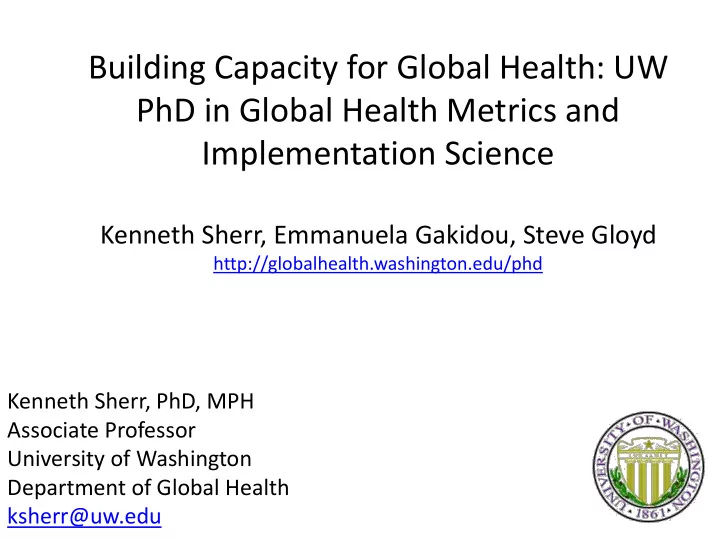

Building Capacity for Global Health: UW PhD in Global Health Metrics and Implementation Science Kenneth Sherr, Emmanuela Gakidou, Steve Gloyd http://globalhealth.washington.edu/phd Kenneth Sherr, PhD, MPH Associate Professor University of Washington Department of Global Health ksherr@uw.edu
Background • Massive funding increase: Demand for timely, quality information to guide strategies on how to scale-up EB guidelines • High demand for advanced global health researchers • 2008 - 2010: UW PhD Applicants with GH focus rose from 22-34% in health services, 2-11% in epidemiology • Few doctoral programs in global health nationally, none with focus on measurement and implementation science Source: http://www.healthdata.org/impact-11/innovations
Program Goal Train the next generation of global health researchers in measurement and implementation science for careers in academic institutions, national institutions (MOH), and international organizations METRICS IMPLEMENTATION SCIENCE Learn and apply advanced Identify and address barriers quantitative methods, impact to effective implementation evaluation techniques, and and scale-up of evidence- analytic tools. Students design based interventions by and develop new ways to developing and applying tackle critical global health cutting-edge implementation measurement challenges. science methodologies and analytical approaches.
PhD in Metrics & Implementation Science Milestones • March, 2011: Planning began • May, 2012: Program approval • Sept. 2012: First cohort • June, 2015: First graduate ‘Being the first M.D./Ph.D. graduate in implementation science in my country, it's hard to have an impact on your own. What would be very appropriate for me to do is to build capacity for implementation science, within the Ministry of Health, the universities and implementing agencies in health, and also mentor people who are interested in implementation science. This will have a bigger impact than working alone. If we can build that capacity so that there's a critical mass of people suffused through the entire health sector, to me, that would be a very useful way of spending my time .’ -Peter Cherutich, MBChB, PhD, MPH, Deputy Director for Medical Services, Kenya MOH https://www.fic.nih.gov/News/GlobalHealthMatters/january-february- 2016/Pages/peter-cherutich-value-of-research-training.aspx
Program Requirements • 100 credit minimum – 33 core credits – 15 area of emphasis credits – 30 dissertation credits – Remaining credits in elective courses • Written preliminary exam (4-day, 4 questions) • Written and oral general exam • Dissertation defense • Feasible completion within 4-5 years
Course Structure Type Course area (credits) Core Coursework Problems in Global Health (4) Doctoral Seminar (4) Epidemiology (8) Statistics (8) Fundamentals of Implementation Science (5) Mortality Measurement (4) Area of Emphasis Advanced GH Research Methods (8) Requirements Operations Research (4) Leadership, Policy, Management (3) Electives Mixed Methods and Topical Courses Field Research and 30 credits Dissertation
PhD Applications, 2012 - 2017 PhD Applications by Area of Emphasis 100 90 80 70 60 50 40 30 20 10 0 PhD Applicant Citizenship Countries 2012 2013 2014 2015 2016 2017 IS applications Metrics applications
PhD Applications, Offers & Acceptances Implementation Science 2017 2016 2015 2014 2013 2012 Applications received 72 61 54 57 61 4 Positions offered 4 6 5 5 1 Positions accepted 3 4 4 4 1 Percent of total offers accepted 75% 67% 80% 80% 100% Metrics 2016 2016 2015 2014 2013 2012 Applications received 27 31 36 41 27 3 Positions offered 2 4 4 4 2 Positions accepted 0 2 1 3 2 Percent of total offers accepted 0% 50% 25% 75% 100% Total Applications 99 92 90 98 86 7 Percent of total offers accepted 50% 60% 45% 78% 100%
PhD Students, 2012-2016 (N=25) PHD STUDENTS BY BACKGROUND INSTITUTION MOH Applied research (iNGO, CDC, other) US Academic research Countries IS Metrics US 5 (31%) 6 (67%) China 3 (19%) 1 (11%) France 0 1 (11%) Kenya 4 (25%) 0 LMIC academic research Mozambique 1 (6%) 0 Rwanda 1 (6%) 0 Previous Training (IS + Metrics) Sudan 1 (6%) 0 MPH 23 (92%) Uganda 1 (6%) 0 MA/MS 2 (8%) Zimbabwe 0 1 (11%) MD/MBChB 8 (32%) Total 16 (100%) 9 (100%)
Funding Students • Federal Sources (5/20%) – NIH/D43 – Research awards (NIH, CDC) • Non-Federal sources (20/80%) – Doris Duke Charitable Foundation African Health Initiative – Bill and Melinda Gates Foundation – GAVI – China Medical Board • Teaching assistantships & UW institutional support
Research Topics for Doctoral Research Implementation Science Metrics Scientific methods applied to Develop and improve analytic understand and improve delivery for methods to measure the world’s priority global health topics leading health problems • Stepped wedge trial of community- • Application of Global Burden based mental health delivery in China Disease estimation to Indonesia • Process evaluation of introduction of • Small Area Estimates for sub- HPV introduction in Mozambique: CFIR, national immunization coverage social networks and economic analysis estimates • Mixed-methods investigation of an • Improving geospatial methods to integrated NTD elimination platform measure all-cause and cause- specific mortality globally • Cluster trial to assess the effectiveness and budget impact of partner services for HIV testing in Kenya
Challenges, Adaptations, & Opportunities Challenges & Adaptations Opportunities • Curriculum: • High need and demand – What are Global Health IS core • Program focus helps reach competencies? across and re-define disciplines: – Built on existing coursework IS as a signature science (content & level appropriateness) • Recognition of need to increase – Filled in gaps through seminars, implementation science capacity add-ons to established courses as among funders new courses are developed • Graduates entering the • Funding to build a new program workforce to define career paths targeting LMIC students and demonstrate program value – Broader faculty engagement to support research assistantships • Recruitment: Global Health is not a discipline + no track record for graduates
Recommend
More recommend